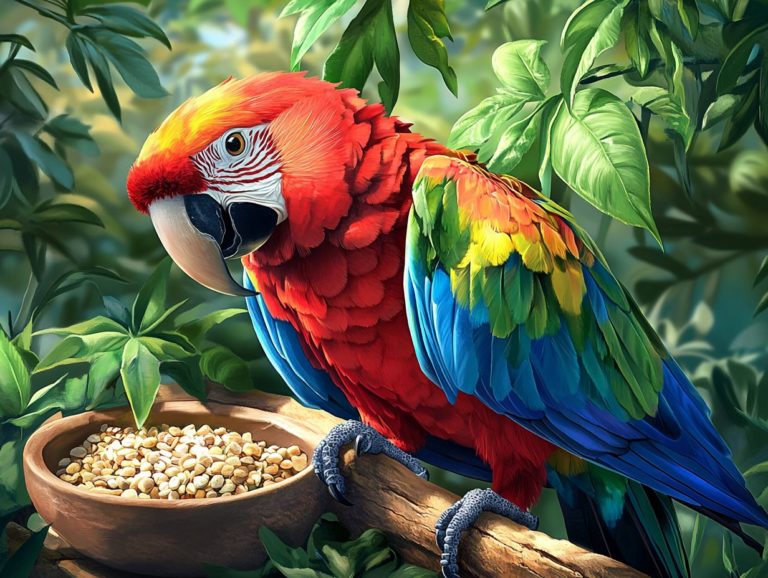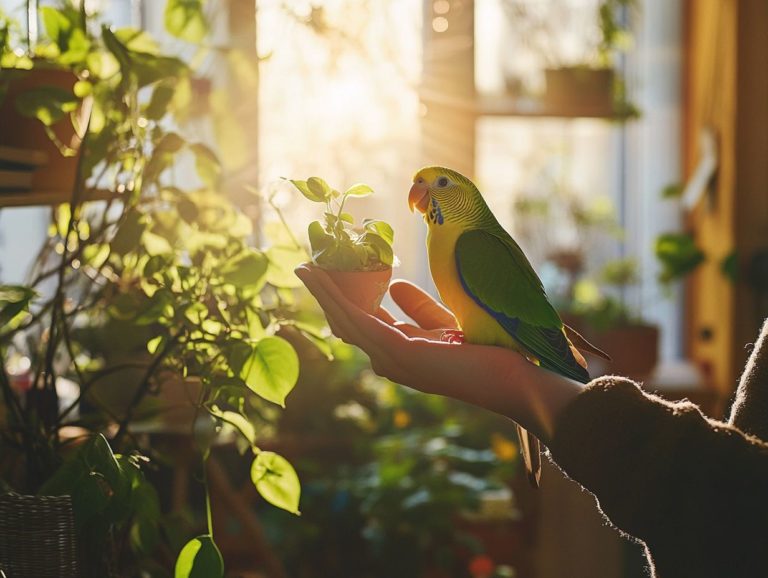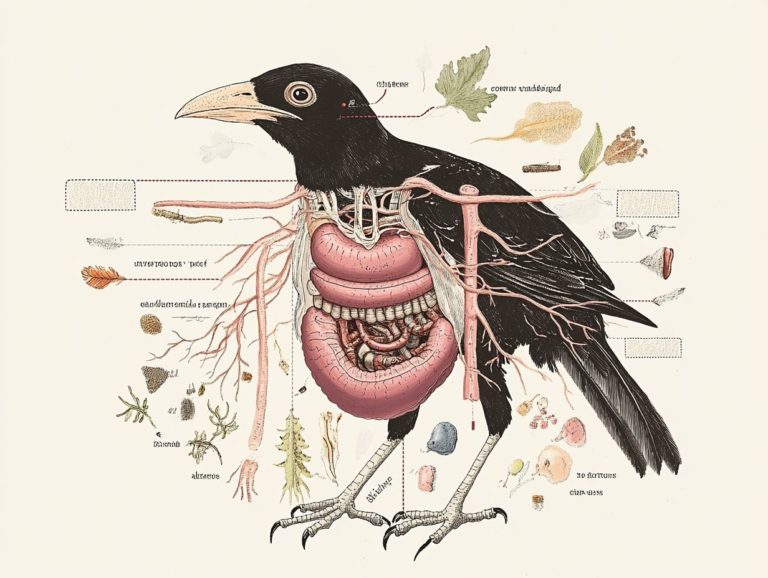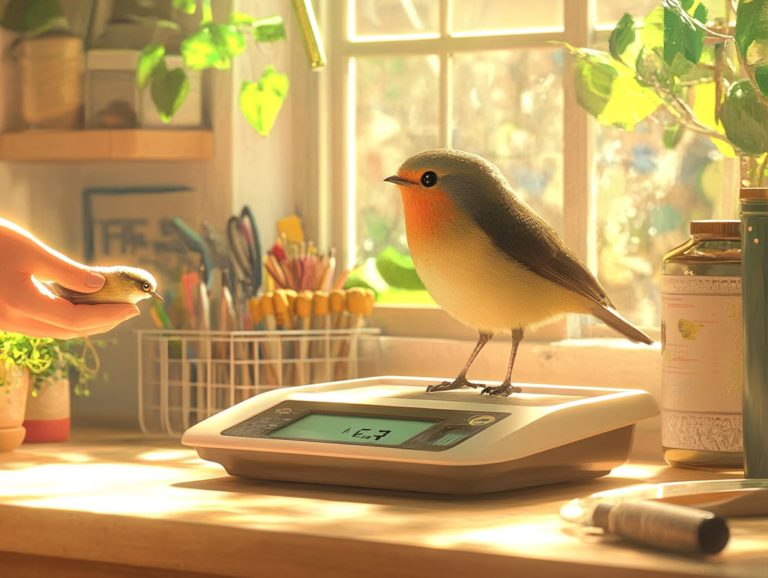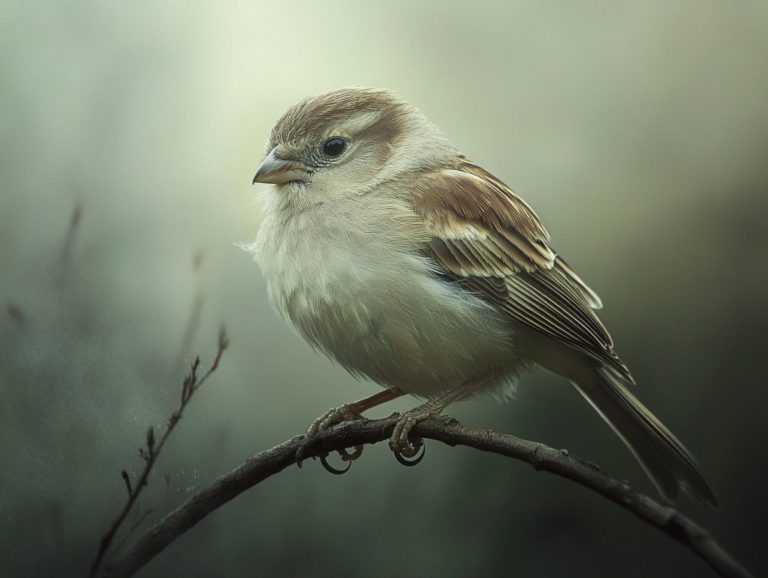How Stress Affects Your Bird’s Health
Birds, much like humans, encounter stress that can profoundly affect their overall health and well-being. As a bird owner, it’s essential to grasp the common sources of stress that your feathered companions face.
This article delves into the effects of stress on birds, bringing to light the physical and behavioral signs you should be vigilant for. You ll find practical tips to create a calm home, ensuring your bird thrives!
Contents
Key Takeaways:

- Stress can significantly impact your bird’s health, leading to physical and behavioral changes.
- Common signs of stress include feather plucking, aggression, and changes in appetite or vocalization.
- Creating a low-stress environment and using stress-reducing techniques can help manage stress in your bird.
Understanding Stress in Birds
Understanding stress in birds, especially in species like cockatoos, African grays, and Eclectus parrots, is vital for ensuring their well-being and quality of life in captivity. These birds are sensitive beings with complex emotional health needs.
Stress can show up in various ways, from behavioral changes to physical health issues. Chronic stress might trigger physical reactions like elevated stress hormones, which can undermine their immune systems and overall happiness.
By identifying the root causes of stress, you can empower yourself as an avian trainer or caretaker to provide better care and tailor their environment to meet their unique needs.
Common Causes and Effects of Stress
Common causes of stress in birds can vary widely, from shifts in their environment to simple boredom and a lack of interaction. An abrupt change in their habitat, whether due to a new home setup or the introduction of other pets, can disrupt their sense of security.
As inherently social creatures, birds thrive on interaction. Without sufficient engagement from their owners or flock-mates, they can feel isolated and distressed. Excessive noise from household activities can heighten their anxiety, making them increasingly on edge.
When left unaddressed, these stressors may lead to undesirable behaviors, such as aggression or self-destructive tendencies. Act now providing attentive care is crucial for their happiness!
The effects of stress on birds can be profound. You might notice signs of stress in African Grey parrots, such as feather plucking or excessive vocalization, which indicate distress. These behaviors not only jeopardize their psychological well-being but can also result in serious long-term health consequences.
Prolonged stress can weaken their immune systems, making them more susceptible to diseases and ultimately affecting their longevity. Therefore, identifying and mitigating these stressors is crucial for their overall health and happiness.
Signs of Stress in Birds
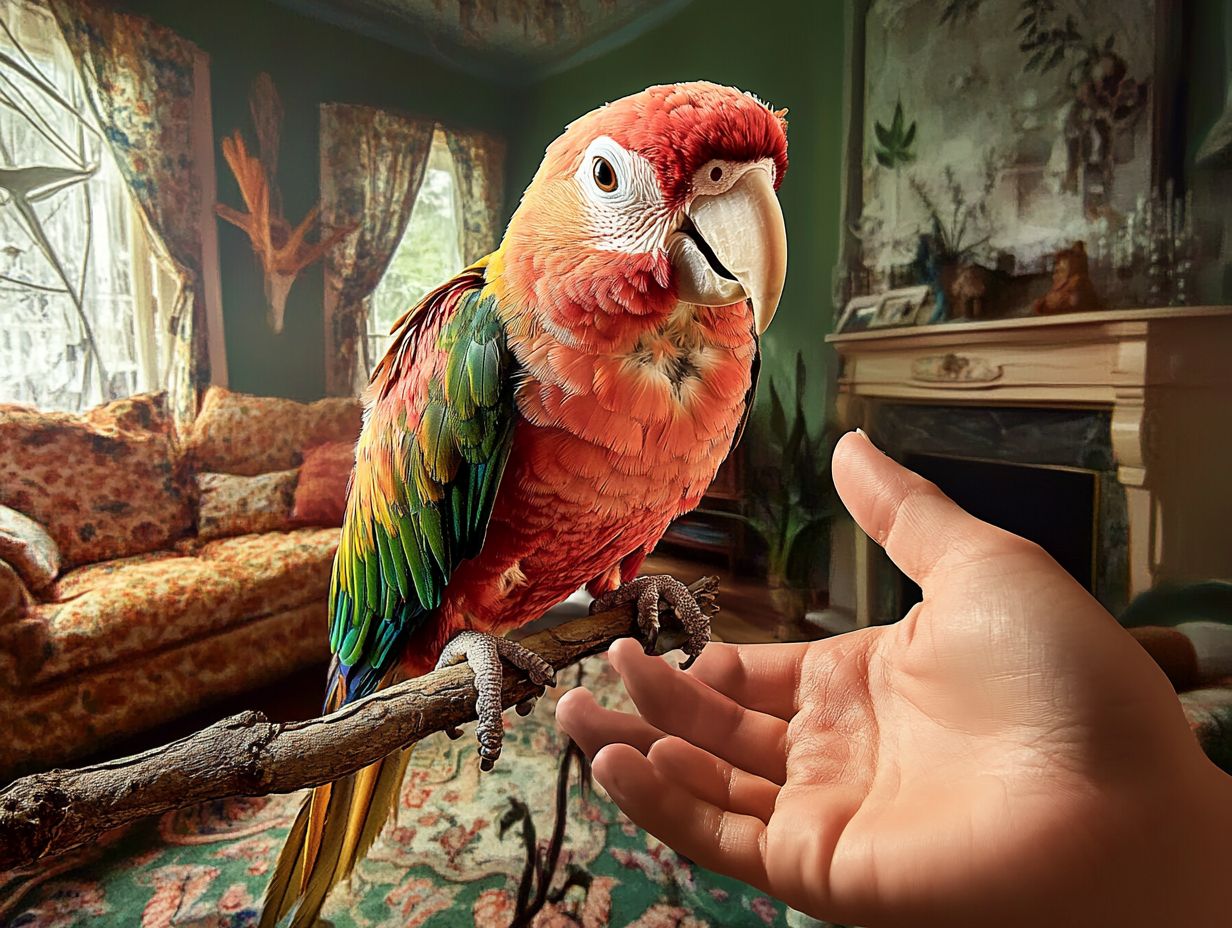
Recognizing the signs of stress in birds is essential for caregivers and veterinarians. These indicators can manifest in both physical and behavioral ways, providing insight into the emotional state of the bird.
Understanding these cues allows you to provide the best possible care and support for your feathered companions. Always consult a veterinarian if you notice any concerning behaviors or signs of stress.
Physical and Behavioral Indicators
Physical and behavioral indicators of stress in birds manifest in various ways. Changes in vocalization patterns, increased biting, and problematic behaviors like feather picking often signal discomfort that requires your attention.
Pay close attention to these signs, as they can reflect the emotional well-being of your bird. A shift in vocalizations may indicate anxiety or agitation. Increased aggression or biting might stem from feelings of threat or insecurity. Feather picking typically points to deeper psychological stress.
As a caregiver, being attuned to these manifestations is essential; they serve as vital cues that may prompt the need for veterinary consultations.
By addressing not only the visible signs but also understanding the emotional health of your feathered companion, you can cultivate a nurturing environment that enhances your pet’s overall quality of life. Proactively monitoring and addressing any behavioral changes can significantly contribute to a happier, healthier bird.
Managing Stress in Birds
Managing stress in birds demands a complete plan that encompasses proper care, thoughtful environmental management, and enrichment strategies designed to elevate their well-being and emotional health.
Creating a Low-Stress Environment
Creating a low-stress environment for your birds involves a thoughtful blend of visual barriers, social interaction, and comfort within their habitats.
This multifaceted approach not only eases their anxiety but also cultivates a sense of security for your avian companions. Visual barriers like lush plants can help reduce overstimulation from outside distractions.
Fostering social companionship can involve introducing compatible bird species or facilitating regular interactions with caregivers, both of which can greatly enhance their emotional well-being.
Make their habitat exciting! Enrich their space by adding perches of various sizes and textures, including toys that engage their minds, and maintaining a consistent daily routine. When you combine these elements, you create an environment where your birds can truly thrive and feel at ease.
Stress-Reducing Techniques

Implementing stress-reducing techniques like consistent training, increased interaction, and enriching activities can significantly enhance your birds’ emotional well-being.
These strategies not only strengthen the bond between you and your feathered friends but also stimulate their cognitive abilities, fostering trust and social skills.
When you conduct regular training sessions, they can transform into positive experiences, encouraging your birds to demonstrate desired behaviors while alleviating anxiety.
By incorporating toys that promote problem-solving or foraging, you enrich their environment, allowing them to engage in natural behaviors that support emotional balance. These methods enhance your birds’ quality of life and contribute to their physical well-being by minimizing stress-related issues, ultimately cultivating a happier and healthier avian companion.
Preventing Stress in Birds
Preventing stress in birds requires a proactive approach on your part. Establishing a stable routine and minimizing their exposure to stressful situations through thoughtful training and interaction can make all the difference.
By being attentive to their needs, you create an environment where they can thrive.
Start implementing these tips today and watch your feathered friends thrive!
Tips for Preventing Stressful Situations
To effectively prevent stressful situations for your birds, consider adopting various tips aimed at establishing a consistent routine and enhancing their environment.
Monitor your birds’ interactions to gain valuable insights into their behavior. Creating a stable habitat not only alleviates anxiety but also promotes overall well-being.
Ensure that feeding times, play periods, and social interactions occur at regular intervals. This approach helps your birds feel secure and understood.
Look for signs of stress or discomfort early on. Routine care, such as regular cleaning and adding fun toys to their living space, fosters a healthier and happier atmosphere. This ultimately enhances the mental and emotional health of your feathered friends.
Frequently Asked Questions
How does stress affect my bird’s health?

Stress can affect your bird’s health in numerous ways. It can suppress their immune system, cause digestive issues, and lead to behavioral changes. Recognizing the signs of stress in pet birds and how to help is crucial for their well-being.
What are the signs that my bird is stressed?
Signs of stress in birds can include decreased activity, changes in appetite, feather plucking, excessive vocalization, and alterations in their droppings.
Can stress lead to physical health problems in my bird?
Yes, prolonged stress can weaken your bird’s immune system. For more insights, understanding bird behavior: health indicators shows that chronic stress makes them more susceptible to health issues and infections.
How can I help reduce stress in my bird?
Providing a calm, welcoming space for your bird, plenty of mental and physical stimulation, and a balanced diet can support their emotional health.
Can changes in routine or environment cause stress in my bird?
Yes, birds are creatures of habit. Unexpected changes in their routine or environment can lead to behavioral changes such as biting, vocalization, or feather picking.
What should I do if I suspect my bird is stressed?
If you notice signs of stress in your bird, such as changes in appetite, vocalization, or aggression, it’s important to address the underlying cause. Additionally, understanding the effects of loud noise on avian health can help you create a calmer environment. If stress continues, consult a vet for advice.
Start implementing these tips today to keep your bird happy and healthy!

